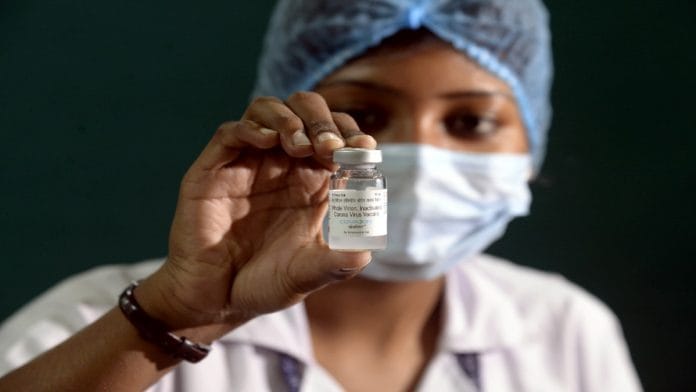New Delhi: India may have decided to administer a third shot of the Covid vaccine as precaution starting 10 January, but as far as Bharat Biotech’s Covaxin goes, there is currently no scientific evidence on the effect it will have on the eligible population.
On Wednesday, the government had said that the precaution dose, to be given to healthcare workers, frontline workers and those aged 60 years and above with co-morbidities will be the same as that of the first two jabs.
There are some Lancet studies that have looked at a third dose of the AstraZeneca vaccine, known in India as Covishield, which has been administered to over 90 per cent eligible Indians.
“There are some papers in The Lancet about the administration of a third dose of Covishield. I have searched the literature so far on a Covaxin third dose. But this (administration of same vaccine as third dose) is a decision that has been taken by NTAGI (National Technical Advisory Group on Immunisation) and the ministry of health,” said Dr Samiran Panda, chief of epidemiology and infectious diseases at the Indian Council of Medical Research (ICMR).
NTAGI is the highest technical body that analyses scientific evidence to decide on all vaccines that are administered in the country, including those under the Universal Immunisation Programme.
ThePrint reached Bharat Biotech over phone to inquire about any evidence on the immunogenicity, safety of a third shot of Covaxin. “We are currently doing trials on that. The results will be out soon,” said a company spokesperson.
ThePrint also reached NTAGI’s Covid working group chief Dr N.K. Arora and NITI Aayog member (health) and co-chair of the National Advisory Group on Vaccines against Covid-19 (NEGVAC) Dr V.K. Paul over phone and WhatsApp to understand what evidence informed the decision to administer the same vaccine as a precautionary dose. This report will be updated when a response is received.
A senior government official who is in the know said: “There are studies on AstraZeneca. Also Bharat Biotech has some Covaxin data that it has shared with DCGI on booster shots. What is important is that we are using the same vaccine so there are no additional concerns. The only question is about the timing but we know that for both Covishield and Covaxin antibodies would decline over time. Typically respiratory infection vaccines need annual boosters. Hence the decision.”
Bharat Biotech sought DCGI nod for booster dose trials only last month.
The Lancet papers on AstraZeneca
In a paper published in The Lancet in September last year, researchers from the University of Oxford — which is where the AstraZeneca vaccine was first developed — reported the results of a substudy on the third dose of the Covishield vaccine. They concluded: “An extended interval before the second dose of ChAdOx1 nCoV-19 (Covishield) leads to increased antibody titres. A third dose of ChAdOx1 nCoV-19 induces antibodies to a level that correlates with high efficacy after second dose and boosts T-cell responses.”
The results of another trial conducted in the UK, known as the ‘COV-BOOST’ trial, that looked at the immunogenicity (ability to provoke an immune response) of a range of vaccines after two doses of the AstraZeneca or Pfizer vaccines, were also published in The Lancet. The study concluded that a third dose of the AstraZeneca vaccine is immunogenic, as are a range of other vaccines administered as booster shots.
Questions are already being raised about the scientific evidence that the central government had at its disposal while taking the decision to administer the precautionary dose.
“There is no data to back this decision (to administer the same shot). The COV-BOOST trial data on Ox-Az (Covishield) x 3 doesn’t inspire confidence. Of the options available to Indians, Covavax performs the best as a booster. Covavax (by the Serum Institute) received EUA in India on 28 Dec,” Dr Ambarish Satwik, vascular surgeon at Delhi’s Sir Ganga Ram Hospital tweeted Wednesday.
There is no data to back this decision. The COV-BOOST trial data on Ox-Az (Covishield) x 3 doesn’t inspire confidence. Of the options available to Indians, Covavax performs the best as a booster. Covavax (by the Serum Institute) received EUA in India on 28 Dec. https://t.co/MGDXSHb5So
— Ambarish Satwik (@AmbarishSatwik) January 5, 2022
Also Read: Antibody cocktails, oral pills: These are the Covid treatments available as Omicron surges
‘9-month interval for third shot as antibodies last 6-13 months’
For now, the precautionary dose will be administered to healthcare and frontline workers and senior citizens who have completed at least nine months since they received the second shot. This process will start from 10 January. Any person who has completed the requisite interval will get messages on their registered mobile numbers about them being eligible for a third shot.
Asked how this 9-month interval was decided, ICMR’s Dr Panda said: “There are a lot of studies that show that antibodies from either vaccination or infection last for anything between 6-13 months. Obviously there are many other aspects of the immunity that cannot be measured such as cell-mediated immunity and immune memory. Even when antibodies are zero, it does not mean that there is no immunity.”
There is currently no estimate of how many Indians have had three immune exposures to the virus — two shots and one infection. But there are hopes that this is a high number, and that would also give some protection against the surging Omicron variant of Covid-19, said health officials.
(Edited by Gitanjali Das)
Also Read: Delta to Omicron — India needs to avoid Covid complacency in 2022






